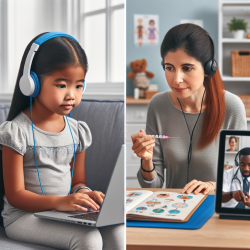Introduction
Developmental Language Disorder (DLD) affects approximately 7% of the population, presenting challenges in language acquisition and development that are not attributable to other conditions. Children with DLD often struggle with oral narrative skills, which are crucial for academic success and social interactions. Recent research by Iuliu, Martínez, and Meinzen-Derr (2021) explores the potential of tele-practice interventions to improve these skills in children with DLD.
Research Overview
The study focused on a 9-year-old child with DLD, employing a narrative intervention via tele-practice. The intervention consisted of ten sessions using the Skype platform, where the child engaged in retelling a story, "The Lost Backpack," with visual support. The intervention aimed to enhance the child's narrative skills at both microstructure (e.g., vocabulary, syntax) and macrostructure (e.g., story organization) levels.
Key Findings
- Significant improvements were observed in the child's narrative skills, including increased Mean Length of Utterance (MLU), vocabulary diversity, and use of discourse markers.
- The child demonstrated better story organization and recall of events, indicating enhanced macrostructural narrative skills.
- Tele-practice proved to be an effective medium for delivering speech-language interventions, providing accessibility and maintaining engagement through visual aids.
Implications for Practitioners
This study highlights the potential of tele-practice as a viable alternative to traditional face-to-face interventions, especially in circumstances where in-person sessions are not feasible. Practitioners are encouraged to consider incorporating tele-practice into their therapeutic repertoire, utilizing visual aids and structured narrative tasks to enhance outcomes for children with DLD.
Encouraging Further Research
While this case study provides promising results, further research is needed to validate these findings across a larger population. Practitioners and researchers are encouraged to explore the scalability of tele-practice interventions and their long-term impacts on narrative skills in children with DLD.
To read the original research paper, please follow this link: Oral Narrative Intervention by Tele-Practice in a Case with Developmental Language Disorder.










